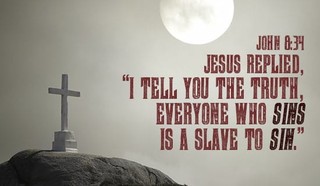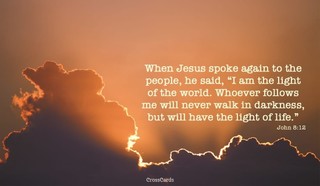
- Recent Translations
- All Translations
John 8:36
Share
Settings
John 8:36 Meaning and Commentary
If the Son therefore shall make you free
Alluding to the custom of adoption by the sons or brethren in the family, which obtained in Greece, called (adelfoyesia) , "the adoption of brethren", as Grotius, and others have observed; or rather to a custom among the Romans, of a son's making free after his Father's death, such as were born slaves in his house. Such a case as this is supposed F8;
``a man having a son or a daughter by his maidservant, that which is born of her, since of a servant, is without doubt a servant: wherefore if he (the son) should say, this is my natural brother or my natural sister; for since my father had children by his maidservant, "whom he did not make free"; and he dying the law has made me lord of these, (egw toutouv eleuyerwsa) , "I have made these free", because of their natural kindred.''This is allowed to be a just and good reason of manumission. Now this answers very much to the case in hand. Men are home born slaves; the chosen people of God are such by nature; they are born in sin, and are the servants of it; Christ the Son makes them free; and then they are no more foreigners and strangers, but fellow citizens with the saints, and of the household of God. This suggests, that true freedom is by Jesus Christ, the Son of God; see ( Galatians 5:1 ) . He it is that makes the saints free from sin; not from the being of it in this life, but from the bondage and servitude of it, from its power and dominion, and from its guilt and liableness to punishment for it, by procuring the pardon of their sins through his blood, and justifying their persons by his righteousness: he also makes them free, or delivers them from the captivity of Satan, by ransoming them out of his hands, taking the prey from the mighty, binding the strong man armed, and delivering them from him, and from the power of darkness, and putting them into his own kingdom; he does not indeed free them altogether from his temptations, but he preserves them by his power from being hurt and destroyed by him: he likewise makes his people free from the law, not only the ceremonial law, which is abolished by him, but from the moral law; not from obedience to it, as it is in his hands, and a rule of walk and conversation to them, but as in the hands of Moses, and as a covenant of works, and from the rigorous exaction of it, and from seeking justification and life by it, and from its curse and condemnation: and he gives them freedom of access to God, as their Father, through his blood and by his Spirit; and admits them to all the privileges and immunities of the church below; and gives them a right to, faith in, and an expectation of the glorious liberty of the children of God hereafter; and such are truly Christ's freemen:
ye shall be free indeed;
this is true freedom; what the Jews boasted of, supposing what they said was right, was but a shadow of freedom in comparison of this; and that liberty which sinful men promise themselves in sin, is all deceit; there is no true, solid, substantial freedom but what is by Christ, the Son of God. Even that freedom which the children of God had under the legal dispensation, was a servitude, in comparison of that which the saints enjoy by Christ under the Gospel dispensation; though they were sons and heirs, yet being in bondage, differed nothing from servants, being under tutors and governors, in bondage under the elements of the world, and under the influence of a spirit of bondage unto fear; see ( Galatians 4:1-3 ) ( Romans 8:15 ) ; but such that have received the spirit of adoption from Christ, they are really free: they have not only the name of children, and of freemen, but they are truly such, and wholly so; perhaps there may be some reference had to such sort of persons among the Jews, who were partly servants, and partly free: so it is said F9,
``(dbe wyuxv ym) , "he who is half a servant", or partly a servant, and partly free, shall serve his master one day, and himself another.''And such an one, as the commentators F11 say, is one who is a servant of two partners, and is made free by one of them; or who has paid half his price to his master (for his freedom), but the other half is still due: and of one in such circumstances it is said F12, that
``he that is partly a servant, and partly free, may not eat of his master's (lamb at the passover):''but now those who are made free by Christ the Son of God, they are not in part only, but are wholly free, and have a right to all the privileges of his house, to the supper of the Lord, and to every other immunity.
F8 Theophili Antecensor. Institut. Imperat. Justinian. l. 1. tit. 6. sect. 5. p. 38.
F9 Misn. Gittin, c. 4. sect. 5. & Ediot, c. 1. sect. 13.
F11 Maimonides, Jarchi, & Bartenora in ib.
F12 Misn. Pesachim, c. 8. sect. 1.


